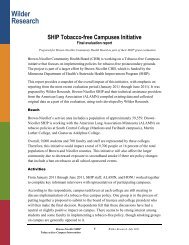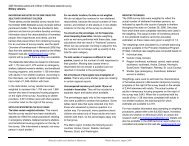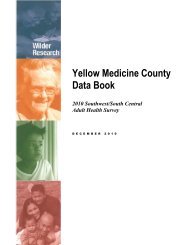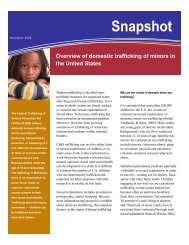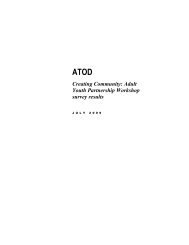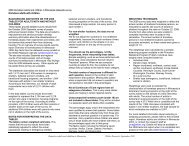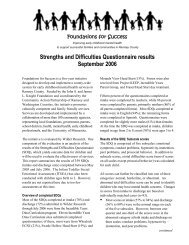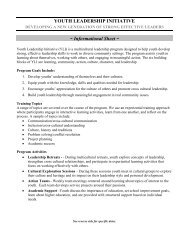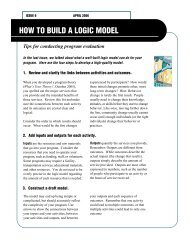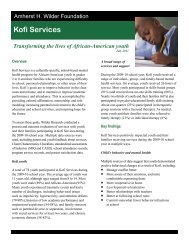Tips for conducting program evaluation. - Minnesota Department of ...
Tips for conducting program evaluation. - Minnesota Department of ...
Tips for conducting program evaluation. - Minnesota Department of ...
You also want an ePaper? Increase the reach of your titles
YUMPU automatically turns print PDFs into web optimized ePapers that Google loves.
ETHICAL ISSUES<br />
Page 2<br />
Risks and benefits, continued:<br />
benefits. Other sections <strong>of</strong> this tip sheet<br />
address safety and confidentiality. In<br />
addition, consider these suggestions:<br />
• Keep <strong>evaluation</strong> procedures as brief<br />
and convenient as possible to minimize<br />
disruptions in subjects’ lives.<br />
• Do not ask emotionally troubling<br />
questions, unless they are necessary<br />
to help you improve services.<br />
• Provide incentives, such as food,<br />
money, or gift certificates.<br />
The time and money spent on <strong>evaluation</strong><br />
are maximized when the results have value.<br />
Target your <strong>evaluation</strong> to key questions,<br />
carefully review findings, and use your<br />
results. Upcoming tip sheets will provide<br />
strategies <strong>for</strong> using <strong>evaluation</strong> to improve<br />
services, demonstrate your <strong>program</strong>’s value,<br />
and guide policy and advocacy ef<strong>for</strong>ts.<br />
In<strong>for</strong>med consent<br />
Everyone who participates in the <strong>evaluation</strong><br />
should do so willingly. In general, people<br />
participating in any research project, including<br />
an <strong>evaluation</strong>, have the right to:<br />
• Choose whether or not to participate<br />
without penalties (e.g., participation<br />
should not be a requirement <strong>for</strong><br />
receiving services).<br />
• Withdraw from the project at any time,<br />
even if they previously gave consent.<br />
• Refuse to complete any part <strong>of</strong> the project.<br />
The word “in<strong>for</strong>med” is important – people<br />
have the right to understand all implications<br />
<strong>of</strong> their decision whether or not to participate.<br />
To ensure that potential participants can<br />
make an in<strong>for</strong>med decision:<br />
• Provide them with in<strong>for</strong>mation about<br />
the <strong>evaluation</strong> (what you will ask them<br />
to do, how you will you use the results,<br />
and how long it will take).<br />
• Describe the benefits <strong>of</strong> participation<br />
and any <strong>for</strong>eseeable risks, including<br />
possible discom<strong>for</strong>t.<br />
• Share this in<strong>for</strong>mation using understandable<br />
language – avoid jargon and<br />
translate if needed.<br />
• Answer any questions they have about<br />
the <strong>evaluation</strong>.<br />
Participants may not need to sign a consent<br />
<strong>for</strong>m if they are capable adults, have not<br />
been coerced, and will not be put at risk.<br />
For example, if you ask clients to fill out an<br />
anonymous survey about their satisfaction<br />
with a shelter, the fact that they complete<br />
the survey can be construed as providing<br />
consent. Signed consent <strong>for</strong>ms may be<br />
necessary, however, especially if you plan to:<br />
• Include children or others who cannot<br />
provide their own consent (in which<br />
case you need consent from a legally<br />
authorized person, such as a guardian).<br />
• Collect very sensitive in<strong>for</strong>mation.<br />
• Use the results <strong>for</strong> purposes other than<br />
<strong>program</strong> improvement, such as publication,<br />
training, or participation in a larger<br />
research project.<br />
• Gather in<strong>for</strong>mation about participants<br />
from third parties, such as <strong>program</strong> staff,<br />
case workers, or family members.<br />
• Require significant time or ef<strong>for</strong>t, such<br />
as time-consuming interviews.<br />
Confidentiality<br />
It is not always possible to conduct<br />
<strong>evaluation</strong>s without identifying in<strong>for</strong>mation,<br />
such as names. However, all <strong>evaluation</strong><br />
in<strong>for</strong>mation should be kept confidential<br />
and not shared with others. To ensure<br />
confidentiality:<br />
• Collect data in a private location where<br />
surveys cannot be seen and interviews<br />
cannot be overheard.



